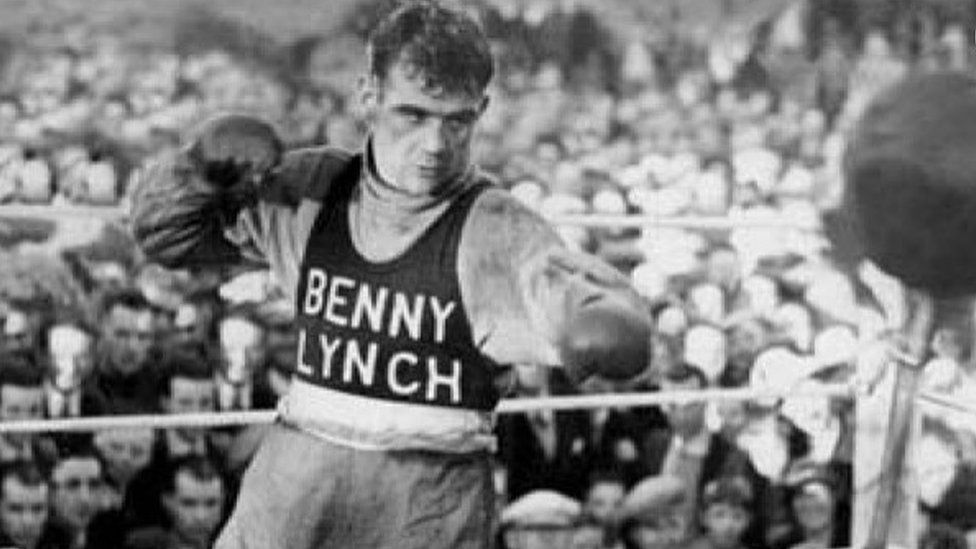Benny Lynch: The rise and fall of the people's champion
- Published

Benny Lynch was Scotland's first boxing world champion by the age of 22 but his career was over when he was 25 and he was dead by 33.
No wonder the meteoric rise and fall of the boxing legend often referred to as the people's champion still generates interest 70 years after his death.
The latest telling of the story of the diminutive tough guy from Glasgow's Gorbals is a new documentary, Benny, to be screened at the Glasgow Film Festival.
Born in 1913, Lynch rose from being a sickly child in the poverty-stricken tenements to become world flyweight champion.
But his descent was as steep as his rise and just over a decade later he was dead, following a battle with alcoholism.
Seumas Mactaggart, one of the producers of the film, says he wanted to focus on Lynch's achievements as a boxer and not his tragic decline.
He says: "When you see the fantastic archive we have it really gives you sense of how hard he could hit.
"These guys were way under eight and a half stone (54kg) but you look at the ferocity of the punches and also the speed at which they moved and it is amazing.
"He could punch with both hands and hit as hard with each of them. When he was at his prime, no-one could touch him."
Benny Lynch (right) starts to dominate Small Montana in 1937
Lynch managed 119 fights in his short career.
He won the world flyweight title in 1935 when he beat Jackie Brown in Manchester, reportedly flooring his opponent eight times before the bout was stopped in the second round.
Jim Watt, who became lightweight world champion 40 years later in 1979, tells the documentary: "Benny is the most important figure as far as Scottish boxing is concerned.
"He was the first one to do it. He showed us that a little guy from Glasgow, a little guy from Scotland, could be champion of the whole wide world."
The film's producer says Lynch was already massively popular in Glasgow before he became world champion.
He says: "There were 2,000 Scots at the fight in Manchester and the place was pandemonium when he won.
"When he came back up to Glasgow, the estimates range from between 20,000 and 100,000 at Central Station.
"It was phenomenal the turnout and the regard that people had for Benny."
Mr Mactaggart says that Benny's problems began soon after he won the world title.
He says: "There was a guy called Sammy Wilson who discovered Benny as a young lad and really mentored him.
"He was almost a father figure to him. He took him all the way through and then unfortunately there was a spilt with Sammy just after he won the world championship.
"Although he went on and was successful after, for Benny you got the feeling that without Sammy as a safe pair of hands and a person in his corner he was a bit lost."
Lynch established himself as the "undisputed" flyweight champion of the world when he narrowly beat Small Montana in London in 1937.
But Mr Mactaggart says the pinnacle of his career was swiftly followed by a decline.
"Once you have the world title you have everything you wanted," he says.
"The feeling was that his hunger went and other distractions came along.
"There were also people who came along looking for a piece of Benny and it was not good for him. There was not someone there to protect him like Sammy Wilson had in the past."
By the following year, Lynch's drinking lifestyle meant that he could no longer make the weight for the flyweight division.
He forfeited his title against American Jackie Jurich because he was overweight.
His last fight was against Aurel Toma in London in October 1938.
It was the first time he had ever been knocked out.
An overweight Benny Lynch is knocked out for the first time in 1938 by Aurel Toma
His boxing licence was revoked on medical grounds in 1939 and he slipped into freefall.
"For Benny, boxing was everything and that was the end," says the documentary producer.
"The boxing ring was his home. It was where he felt most comfortable. Without that it became much more difficult for him."
Lynch made attempts to dry out, spending time in a monastery in Ireland, but died from malnutrition-induced respiratory failure in 1946, at the age of 33.
The grave of Benny Lynch in St Kentigern's Cemetery in Glasgow
The documentary is narrated by Hollywood actor Tommy Flanagan.
The Sons of Anarchy and Peaky Blinders star, who is from Glasgow, is a fan of Lynch and patron of the Remember Benny Lynch Campaign, which aims to get a memorial to the boxer put up in the city.
Mr Mactaggart says Lynch was a "real superstar and a massive celebrity" who had newsreel footage of his bouts and his life shown in US cinemas.
"I think there are lessons to be learned about how we treat young sports stars," he says.
"As soon as that success comes there is so much more that comes with that.
"If he had the right support around him it could have been very different."
- Published8 August 2016